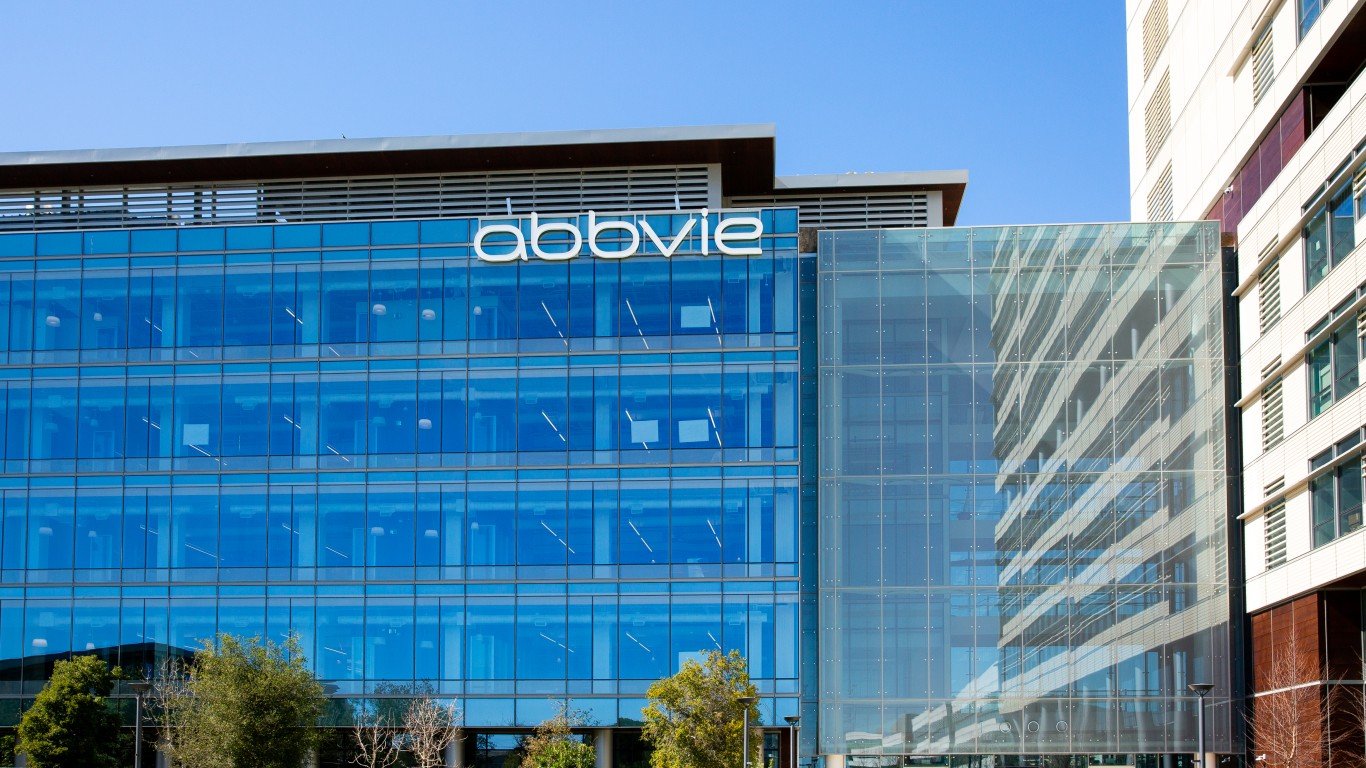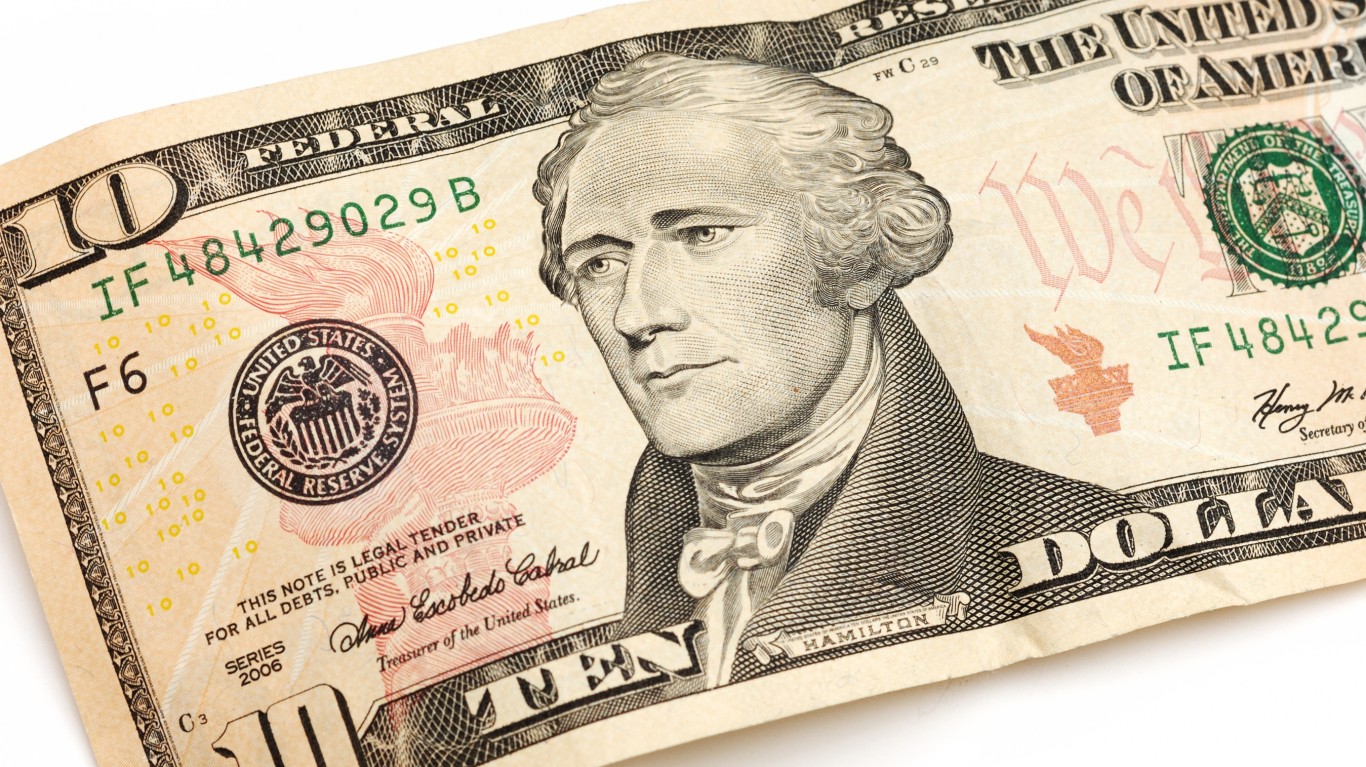

The strong move higher that Nvidia has driven in the stock market this year has been significant, and the world of artificial intelligence has driven stock prices this year. Nvidia’s performance has eclipsed nearly all other assets since the start of the year, posting a remarkable 262% year-to-date growth. This has many investors chasing what may have already gotten away from them, at least for now.
[in-text-ad]
One sector that has been almost disregarded this year is health care. While performance-based fast-money hedge funds may not be that excited about the sector, private equity firms and huge institutions like Blackrock have been buying up all sorts of assets from hospitals to nursing homes to even fertility clinics. In its own literature for its health care fund, Blackrock noted this with the potential for recession possibly right around the corner in 2024:
The sector has a history of stability and outperformance during periods of both recession and inflation, as healthcare demand has historically held firm regardless of economic conditions. Over the last seven recessionary periods in the U.S., healthcare outperformed the broader market by an average of 10%. The sector also has demonstrated relative resilience during inflationary episodes.
While most investors cannot go grab a big chunk of private equity purchases, they can buy the top-yielding stocks in the sector now, those with strong total return potential. We screened our 24/7 Wall St. health care database looking for the top companies with the biggest dividend payouts. Seven stocks hit our screens, and all look tempting for investors looking to steer away from AI-hype-driven stocks.
While all the following are rated Buy, it is important to remember that no single analyst report should be used as a sole basis for any buying or selling decision.
AbbVie
This is a top pharmaceutical stock pick across Wall Street. AbbVie Inc. (NYSE: ABBV) is a global, research-based biopharmaceutical company formed in 2013 following separation from Abbott Laboratories. The company develops and markets drugs in areas such as immunology, virology, renal disease, dyslipidemia and neuroscience.
One of the biggest concerns with AbbVie is what might happen eventually with anti-inflammatory therapy Humira, which has some of the largest sales for a drug ever recorded. The company was concerned, so in June of 2019 it announced that it has agreed to pay $63 billion for rival drugmaker Allergan, the latest merger in an industry in which some of the biggest companies have been willing to pay a high price to resolve questions about their future growth. The purchase officially closed in May of 2020.
AbbVie may be nearing the limits of how far it can boost Humira’s price as cheaper competitors come to market, a problem Allergan is already grappling with as more alternatives to Botox emerge.
Investors receive a 3.98% dividend. Wells Fargo’s target price on AbbVie stock is $165. The consensus target is $169.14, and the stock closed trading on Friday at $149.02.
Amgen
This biotech giant remains a safer way to play the massive potential growth in biosimilars. Amgen Inc. (NASDAQ: AMGN) discovers, develops, manufactures and delivers human therapeutics worldwide. It focuses on inflammation, oncology/hematology, bone health, cardiovascular disease, nephrology and neuroscience.
The company’s products include:
- Enbrel to treat plaque psoriasis, rheumatoid arthritis and psoriatic arthritis
- Neulasta reduces the chance of infection due to a low white blood cell count in patients with cancer
- Prolia to treat postmenopausal women with osteoporosis
[in-text-ad]
- Xgeva for skeletal-related events prevention
- Otezla for the treatment of adult patients with plaque psoriasis, psoriatic arthritis and oral ulcers associated with Behcet’s disease
- Aranesp to treat a lower-than-normal number of red blood cells and anemia
- Kyprolis to treat patients with relapsed or refractory multiple myeloma
- Repatha, which reduces the risks of myocardial infarction, stroke and coronary revascularization
Shareholders receive a 3.35% dividend. HSBC Securities just started coverage, and its $320 target price is well above the consensus target of $241.24. Amgen stock closed on Friday at $259.43.
Bristol-Myers Squibb
This top company remains a solid pharmaceutical stock to own long term and is offering an outstanding entry point after a big tumble. Bristol-Myers Squibb Co. (NYSE: BMY) discovers, develops, licenses, manufactures and markets pharmaceutical products worldwide in the hematology, oncology, cardiovascular and immunology therapeutic classes.
Bristol-Myers Squibb products include the following:
- Revlimid, an oral immunomodulatory drug for the treatment of multiple myeloma
- Opdivo for anti-cancer indications
- Eliquis, an oral inhibitor targeted at stroke prevention in adult patients with non-valvular atrial fibrillation, and the prevention and treatment of venous thromboembolic disorders
- Orencia for adult patients with active RA and prostate-specific antigen, as well as reducing signs and symptoms in pediatric patients with active polyarticular juvenile idiopathic arthritis
- Sprycel for the treatment of Philadelphia chromosome-positive chronic myeloid leukemia
- Yervoy for the treatment of patients with unresectable or metastatic melanoma
- Abraxane, a protein-bound chemotherapy product
- Empliciti for the treatment of multiple myeloma
- Reblozyl for the treatment of anemia in adult patients with beta thalassemia
Bristol-Myers Squibb stock comes with a 3.80% dividend. The BofA Securities target price is $80, while the consensus target is $72.72. The shares closed at $60.82 on Friday.
Cardinal Health
This is a solid way for growth and income investors who are more conservative to play the health care sector. Cardinal Health Inc. (NYSE: CAH) provides customized solutions for hospitals, health care systems, pharmacies, ambulatory surgery centers, clinical laboratories, physician offices and patients in the home in North America, Europe, Asia and elsewhere.
Cardinal’s Pharmaceutical segment distributes branded and generic pharmaceuticals, specialty pharmaceuticals and over-the-counter health care and consumer products. The segment also provides services to pharmaceutical manufacturers and health care providers for specialty pharmaceutical products; operates nuclear pharmacies and radiopharmaceutical manufacturing facilities; repackages generic pharmaceuticals and over-the-counter health care products; and provides pharmacy management services to hospitals.
[in-text-ad]
The Medical segment manufactures, sources and distributes Cardinal Health branded medical, surgical and laboratory products and devices. These include exam and surgical gloves; needles, syringe and sharps disposals; compressions; incontinences; nutritional delivery products; wound care products; single-use surgical drapes, gowns and apparels; fluid suction and collection systems; urology products; operating room supply products and electrode product lines.
The segment also distributes a range of national brand products, including medical, surgical and laboratory products. It provides supply chain services and solutions to hospitals, ambulatory surgery centers, clinical laboratories and other health care providers, and it assembles and sells sterile and non-sterile procedure kits.
The dividend yield here is 2.26%. Baird analysts have set a $108 target price. Cardinal Health stock has a consensus target of $97.65, and Friday’s closing print was $88.78.
Gilead Sciences
This stock is trading at a very reasonable 11 times estimated 2023 earnings and has big-time upside potential. Gilead Sciences Inc. (NASDAQ: GILD) is a research-based biopharmaceutical company that discovers, develops and commercializes medicines in the areas of unmet medical need in the United States, Europe and elsewhere.
The company provides Biktarvy, Genvoya, Descovy, Odefsey, Truvada, Complera/Eviplera, Stribild and Atripla products for the treatment of human immunodeficiency virus (HIV) infection; Veklury, an injection for intravenous use, for the treatment of coronavirus disease 2019; and Epclusa, Harvoni, Vosevi, Vemlidy and Viread for the treatment of liver diseases. It also offers Yescarta, Tecartus, Trodelvy and Zydelig products for the treatment of hematology, oncology and cell therapy patients.
In addition, Gilead provides Letairis, an oral formulation for the treatment of pulmonary arterial hypertension; Ranexa, an oral formulation for the treatment of chronic angina; and AmBisome, a liposomal formulation for the treatment of serious invasive fungal infections.
Gilead has collaboration agreements with Arcus Biosciences, Pionyr, Tizona, Tango Therapeutics, Jounce Therapeutics, Galapagos, Janssen, Japan Tobacco, Gadeta, Bristol-Myers Squibb, Merck and Novo Nordisk.
Gilead Sciences stock investors receive a 4.06% dividend. The $100 Piper Sandler price objective is one of the highest on Wall Street. The consensus target is just $84.44, and Friday’s closing share price was $76.00.
Medtronic
This medical technology giant is a solid pick for investors looking for a safe position in the health care sector. Medtronic PLC (NYSE: MDT) develops, manufactures, distributes and sells device-based medical therapies to hospitals, physicians, clinicians and patients worldwide.
Its Cardiovascular Portfolio segment offers implantable cardiac pacemakers, cardioverter defibrillators and cardiac resynchronization therapy devices; cardiac ablation products; insertable cardiac monitor systems; Tyrx products; and remote monitoring and patient-centered software. It also provides aortic valves, surgical valve replacement and repair products, endovascular stent grafts and accessories and transcatheter pulmonary valves, as well as percutaneous coronary intervention products, and percutaneous angioplasty balloons and products.
The Medical Surgical Portfolio segment offers surgical stapling devices, vessel sealing instruments, wound closure and electrosurgery products, surgical artificial intelligence and robotic-assisted surgery products, hernia mechanical devices, mesh implants, gynecology and lung products, and various therapies to treat diseases, as well as products in the fields of minimally invasive gastrointestinal and hepatologic diagnostics and therapies, patient monitoring, airway management and ventilation therapies, and renal disease.
[in-text-ad]
The Neuroscience Portfolio segment offers products for spinal surgeons; neurosurgeons; neurologists; pain management specialists; anesthesiologists; orthopedic surgeons; urologists; urogynecologists; interventional radiologists; ear, nose and throat specialists; and systems that incorporate energy surgical instruments. It also provides image-guided surgery and intra-operative imaging systems and robotic guidance systems used in robot-assisted spine procedures; and therapies for vasculature in and around the brain.
The Diabetes Operating Unit segment offers insulin pumps and consumables, continuous glucose monitoring systems, smart insulin pen systems, and consumables and supplies.
Shareholders receive a 3.45% dividend. Medtronic stock has a $100 target price at Wells Fargo. The consensus target is $93.48, and Friday’s close was at $79.96.
Pfizer
This top pharmaceutical stock was one of the biggest winners in the COVID-19 vaccine sweepstakes. Pfizer Inc. (NYSE: PFE) discovers, develops, manufactures, markets, distributes and sells biopharmaceutical products worldwide.
The company offers medicines and vaccines in various therapeutic areas, including the following:
- Cardiovascular metabolic and women’s health under the Premarin family and Eliquis brands
- Biologics, small molecules, immunotherapies and biosimilars under the Ibrance, Xtandi, Sutent, Inlyta, Retacrit, Lorbrena and Braftovi brands
- Sterile injectable and anti-infective medicines and oral COVID-19 treatment under the Sulperazon, Medrol, Zavicefta, Zithromax, Vfend, Panzyga and Paxlovid brands.
- Pneumococcal disease, meningococcal disease, tick-borne encephalitis and COVID-19 under the Comirnaty/BNT162b2, Nimenrix, FSME/IMMUN-TicoVac, Trumenba and the Prevnar family brands
- Biosimilars for chronic immune and inflammatory diseases under the Xeljanz, Enbrel, Inflectra, Eucrisa/Staquis and Cibinqo brands
- Amyloidosis, hemophilia and endocrine diseases under the Vyndaqel/Vyndamax, BeneFIX and Genotropin brands
Investors receive a 4.78% dividend. Cantor Fitzgerald’s price objective is $75. The consensus target is lower at $40.99. Pfizer stock ended Friday’s session trading at $34.25.
While Wall Street seems quite content to stay with the “soft-landing” scenarios for the economy, there could be more than one Black Swan out there by the end of the year or in 2024. Interest rates could still go higher, but even if they do not, they could stay at current levels all through next year. These top health care leaders are a solid place for total return and a degree of safety in what soon could be some very rough investing seas to cross.
Sponsored: Attention Savvy Investors: Speak to 3 Financial Experts – FREE
Ever wanted an extra set of eyes on an investment you’re considering? Now you can speak with up to 3 financial experts in your area for FREE. By simply
clicking here you can begin to match with financial professionals who can help guide you through the financial decisions you’re making. And the best part? The first conversation with them is free.
Click here to match with up to 3 financial pros who would be excited to help you make financial decisions.
Thank you for reading! Have some feedback for us?
Contact the 24/7 Wall St. editorial team.
 24/7 Wall St.
24/7 Wall St. 24/7 Wall St.
24/7 Wall St. 24/7 Wall St.
24/7 Wall St.


